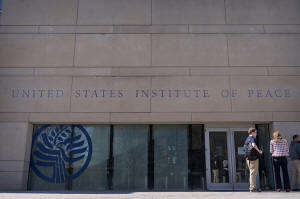Judge is 'offended' at DOGE's tactics but does not pause its takeover of
the US Institute of Peace
[March 20, 2025]
By THALIA BEATY
A federal judge allowed Elon Musk’s Department of Government Efficiency
to remain in control of the U.S. Institute of Peace, an independent
nonprofit created by Congress, but expressed concern about their
conduct.
U.S. District Judge Beryl Howell said Wednesday she was offended by DOGE
staff's use of threats and law enforcement to gain access to the USIP
headquarters and to remove the institute's president, George Moose, from
the building on Monday.
But she declined to immediately restore the former board members, who
filed the lawsuit late on Tuesday, to their positions. Howell also
declined to bar DOGE staff from USIP's headquarters, which they gained
access to on Monday in part with the help of the police.
Trump last month in an executive order targeted USIP and three other
agencies for closure in an effort to deliver on campaign promises to
shrink the size of the federal government.
The institute and many of its board members sued the Trump
administration Tuesday, seeking to prevent their removal and to prevent
DOGE from taking over its operations.
USIP is a think tank, which seeks to prevent and resolve conflicts. It
was created and funded by Congress in 1984. Board members are nominated
by the president and must be confirmed by the Senate.
The suit is the latest challenge to the Trump administration’s efforts
to dismantle U.S. foreign assistance agencies, reduce the size of the
federal government and exert control over entities created by Congress.

Among the board members who filed suit is former U.S. Ambassador to
Russia John Sullivan, who was nominated to the ambassadorial role in
Trump's first term and continued to serve as ambassador under President
Joe Biden and then was picked by Biden for the board.
The lawsuit accuses the White House of illegal firings by email and said
the remaining board members — Defense Secretary Pete Hegseth, Secretary
of State Marco Rubio and National Defense University President Peter
Garvin — also ousted Moose, a former ambassador and career diplomat at
the State Department.
In his place, the three appointed Kenneth Jackson, an administrator with
the U.S. Agency for International Development, according to the lawsuit.
In response, government lawyers raised questions about who controlled
the institute and whether the nonprofit could sue the administration. It
also referenced other recent court rulings about how much power the
president has to remove the leaders of independent agencies.
[to top of second column]
|

People stand outside the headquarters of the United States Institute
of Peace, Tuesday, March 18, 2025, in Washington. (AP Photo/Mark
Schiefelbein).

DOGE staff tried multiple times to access the building Monday before
successfully getting in, partly with police assistance.
The institute's staff had first called the police around 3 p.m.
Monday to report trespassing, according to the lawsuit. But the
Metropolitan Police Department said in a statement that the
institute's acting president — seemingly a reference to Jackson —
told them around 4 p.m. that he was being refused access to the
building and there were “unauthorized individuals” inside.
“Eventually, all the unauthorized individuals inside of the building
complied with the acting USIP President’s request and left the
building without further incident,” police said.
The lawsuit says the institute's lawyer told DOGE representatives
multiple times that the executive branch has no authority over the
nonprofit.
A White House spokesperson, Anna Kelly, said, “Rogue bureaucrats
will not be allowed to hold agencies hostage. The Trump
administration will enforce the President’s executive authority and
ensure his agencies remain accountable to the American people.”
To the top Democrats on the foreign affairs committees in Congress,
New York Rep. Gregory Meeks and New Hampshire Sen. Jeanne Shaheen,
the “hostile takeover” of the institute was one more sign that Trump
and Musk want “to recklessly dismantle historic U.S. institutions
piece by piece.”
The leaders of two of the other agencies listed in Trump's February
executive order — the Inter-American Foundation, which invests in
businesses in Latin American and the Caribbean, and the U.S. African
Development Foundation — also have sued the administration to undo
or pause the removal of most of their staff and cancellation of most
of their contracts.
A federal judge ruled last week that it would be legal to remove
most contracts and staff from the U.S.-Africa agency, which invested
millions of dollars in African small businesses.
But the judge also ordered the government to prepare DOGE staff to
explain what steps they were taking to maintain the agency at “the
minimum presence and function required by law.”
All contents © copyright 2025 Associated Press. All rights reserved |